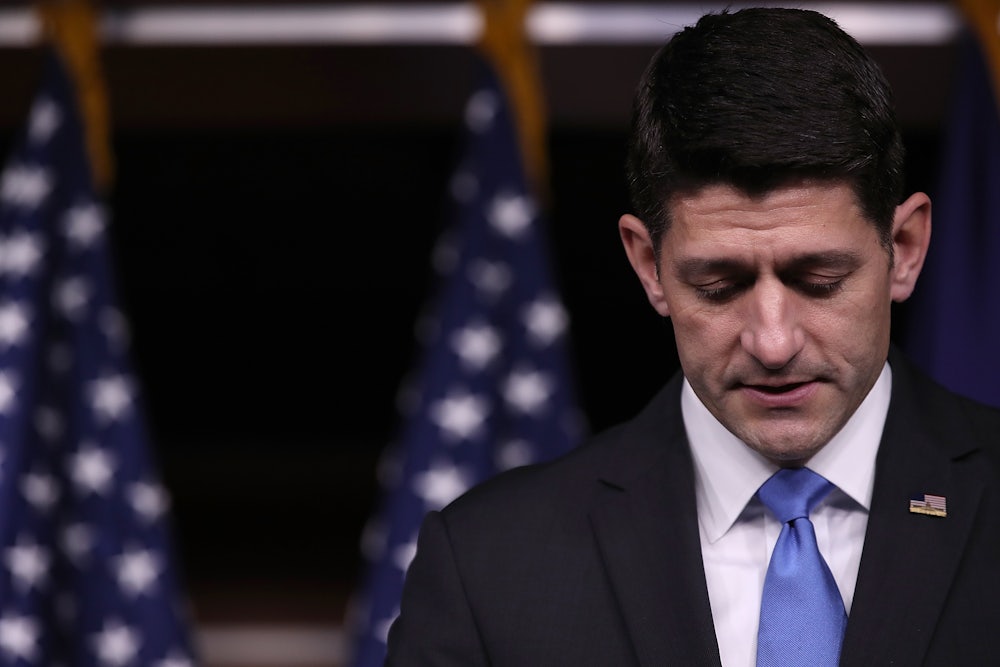The word “teflon” gets tossed around lazily in politics, especially when it’s used to describe Donald Trump, whose constant controversies have made him wildly unpopular. But for years now it’s been a much more fitting adjective for Speaker Paul Ryan.
Before Barack Obama became president, Ryan was a reliable soldier for Bush-era policies—tax cuts, wars, Medicare prescription drug benefits—all of which were financed with debt. After Barack Obama became president, the media anointed Ryan the intellectual leader of the Republican Party’s austerity-based opposition. Having secured an unearned reputation for fiscal discipline, Ryan became chairman of the House Budget Committee, where he propounded a conservative agenda marked by more tax cuts, more military spending, no immediate changes to entitlement spending, and unspecified cuts to the rest of the federal budget. Though they were profligate, Ryan insisted his plans were fiscally sound. Though his claims were mathematically false, they never harmed his image within the Washington establishment.
The closest Ryan ever came to losing favor with his Beltway admirers was after his keynote address at the 2012 Republican National Convention in Tampa, where he accepted the party’s vice presidential nomination. Ryan’s speech was widely panned for trafficking in misleading spin and factual inaccuracies. Afterward, he became embroiled in a weird controversy surrounding his untrue claim to have run a marathon in under three hours.
These sins, too, were quickly forgiven, though, and after losing the 2012 election, Ryan was eventually promoted to the chairmanship of the powerful Ways and Means Committee, and, soon thereafter, to the speakership.
This remarkable record raises the question of whether anything could permanently blemish Teflon Paul Ryan’s reputation for commitment to principle, decency, and sound fiscal policy. If his decision, one month belated, to endorse Donald Trump doesn’t cast a shadow over his legacy, he will go down in history as one of the most deft maneuverers in American political history.
Consider the timeline.
On March 1, 2016, Ryan gained yet more acclaim by obliquely chastising Trump for failing to disavow his white supremacist supporters. “This party does not prey on people’s prejudices,” he said.
When Trump effectively secured the GOP presidential nomination on May 3, many Republicans fell into line, but not Ryan, who promised to hold out for signs that Trump could lead the party in a dignified way.
On May 25, Ryan knocked down stories suggesting his endorsement was imminent.
Two days later, Trump excoriated a federal judge presiding over a case about whether Trump University engaged in fraud as “a total disgrace ... who happens to be Mexican.”
Six days after that, having secured no concessions, and as Trump was quite explicitly preying on people’s anti-Mexican prejudices, Ryan offered Trump his endorsement.
If this time is different, it’s because Ryan is no longer seen simply as a paragon of virtue standing tall in a crowd of vice, but as the most powerful Republican in the country, and as Trump’s antipode within the party.
As House speaker he’ll face regular, high-profile inquiries about Trump’s most recent offenses, whether to conservatism or to good conscience. Every week will be a referendum on his decision. Can you continue to support your party’s presidential nominee? Unlike a convention speech (which lasts one night) or an annual budget (which comes and goes in a matter of weeks) this continual reassessment will serve as an ongoing reminder of how badly the endorsement cuts against the image he presents of himself. It will drag on for months. If you’ve built your public image on claims to ideological commitment and high-mindedness, a cyclical, structural corrective like this should shatter it.
But if anyone’s reputation can survive the punishment it’s about to endure, it’s Paul Ryan’s.
